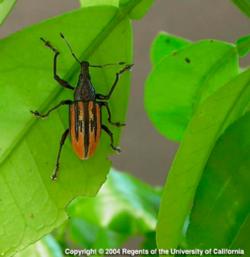Spring 2010 Field Observations
Diaprepes root weevil update
by James Bethke

You may have heard that the Diaprepes root weevil quarantine has been lifted. It is true, and oversight by the regulatory agencies already has changed significantly. Not only do the quarantine areas not exist anymore, but the insect has been downgraded to a B- rated pest, an organism of known economic importance subject to eradication, containment, control or other holding action at the discretion of the individual county agricultural commissioner.
The Agricultural Commissioner in San Diego County takes B- rated pests very seriously and treats them as if they are quarantine pests. Those conditions pose a conundrum for the nursery industry because funding for eradication treatments has ended, which means that the pest can now spread at will.
However, all of the rules and protocols developed by the CDFA for the Diaprepes root weevil quarantine are still in effect if an insect is found in a nursery. That makes it pretty tough on the nursery industry. Without pesticide applications, which have a significant impact on the spread of this insect, as shown by the Diaprepes Project, we are left with releasing as many beneficial organisms as possible to reduce the threat through population reduction.
Our multistate/multiagency project has obtained funding for three more years with the following goals: (1) begin open field releases and monitoring for at least one species of parasitoid from Florida, (2) continue to study the use of parasitic nematodes in potted nursery stock against weevil larvae, and (3) develop parasite rearing techniques in quarantine at UC Riverside for release in San Diego and Orange county infestations.












